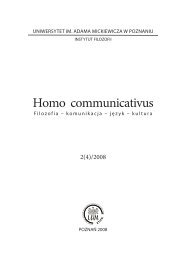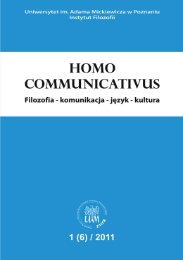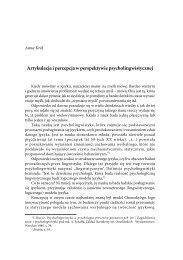wersja elektroniczna (pdf) - Homo communicativus
wersja elektroniczna (pdf) - Homo communicativus
wersja elektroniczna (pdf) - Homo communicativus
- No tags were found...
Create successful ePaper yourself
Turn your PDF publications into a flip-book with our unique Google optimized e-Paper software.
Marietta RadomskaZoosemiotics as a new perspectiveIf a lion could talk, we could not understand him. 1Ludwig WittgensteinIntroductionThis conscise as well as a very famous statement made by Ludwig Wittgensteinin 1958 towards the end of his Philosophical Investigations, has given rise tomultiplicity of debates and provoked detailed studies on animals, language andsubjectivity. Supplemented elsewhere with another Wittgenstein’s contention: “toimagine a language is to imagine a form of life” 2 , it fails to become competely clear.However, both quotations make us aware of the role played by our perception ofthe world and its importance in the process of communication. One has a greatopportunity to learn about it when going abroad to a country with completelydifferent traditions from his own – even if he speaks given country’s languagefluently – he is unable to understand people.Needless to say that the situation with animals would seem to be the same. Theydo have a totally different perception of the world, different background renderingthem completely different from us in that aspect. Vicki Hearne, a poet, a well-knowndog and horse trainer and a student of Wittgenstein’s works writes in her AnimalHappiness (according to the foregoing excerpts): “The lovely thing about Wittgenstein’slion is that Wittgenstein does not leap to say that his lion is languageless, only that heis not talking.” 3 “The reticence of this lion”, she continues, “is not the reticence ofabsence, absence of consciousness, say, or knowledge, but rather of tremendouspresence”, of “all consciousness that is beyond ours”. As such, speaking language isnot an issue in the lion’s world – albeit we are still able to communicate – even if werefuse to use the language. Therefore, we should cease to project our languageconstructions towards the other world and withdraw our specific “human1Ludwig Wittgenstein, Philosophical Investigations, Oxford University Press, Oxford2Ibidem.3Cary Wolfe, Animal rights, p. 45.
















